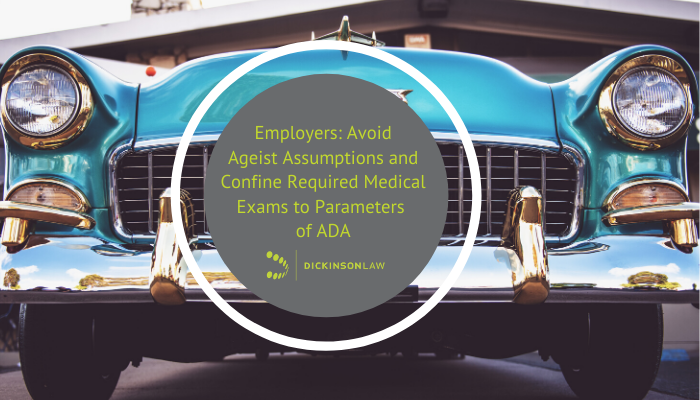Employers: Avoid Ageist Assumptions and Confine Required Medical Exams to Parameters of ADA

Posted on 03/02/2020 at 11:36 AM by Russell Samson
Iowa driver’s licenses expire on the driver’s birthday, and are renewable for an eight-year period – unless, as I was reminded last year when I sought an upgrade to a “REAL ID,” you are “older.” Depending on your age at renewal, a license will not be issued for a period beyond your seventy-fourth birthday. If one is aged 72 or older at the expiration date, Iowa will not give a driver a license for a period of more than two years. The State of Iowa explains: older drivers are not self-regulating enough, and that it is a, “Fact: The crash rate for older drivers is related to physical and mental changes associated with aging.”
Under Iowa Code Section 321.196(4), every time a driver’s license is renewed, the individual’s vision is checked either through a test or a written report which demonstrates that, “the applicant’s visual acuity level meets or exceeds those required by the department.” In addition, the applicant for renewal can be required to submit to both a written examination and a practical driving test at the discretion of the examiner. Summarily, my home state of Iowa requires that older persons who seek to obtain or renew a driver’s license submit to a regular eye examination every two years and perhaps take and pass written and practical driving examinations – something that Iowa does not require of younger individuals.
On February 11, 2020, the EEOC announced that it was suing Yale New Haven Hospital for violating both the Age Discrimination in Employment Act and the federal Americans with Disabilities Act. The focus of the litigation is the Hospital’s "Late Career Practitioner Policy." According to the EEOC’s complaint the policy requires any individual aged 70 and older who applies for or seeks to renew staff privileges at the Hospital to take both neuropsychological and eye medical examinations. The Hospital does not require persons seeking staff privileges who are younger than age 70 to submit to such examinations.
Title I of the Americans with Disabilities Act, at 42 U.S.C. § 12112(d)(4)(A) prohibits a covered employer from requiring an employee to submit to a medical examination or otherwise respond to medical inquiries about any disability “unless such examination or inquiry is shown to be job-related and consistent with business necessity.”
In Hazen Paper Co. v. Biggins, the United States Supreme Court explained the federal Age Discrimination in Employment Act, 29 U.S.C. § 621 et seq.:
Whatever the employer's decisionmaking process, a disparate treatment claim cannot succeed unless the employee's protected trait actually played a role in that process and had a determinative influence on the outcome.
Disparate treatment, thus defined, captures the essence of what Congress sought to prohibit in the ADEA. It is the very essence of age discrimination for an older employee to be fired because the employer believes that productivity and competence decline with old age. . . . Congress' promulgation of the ADEA was prompted by its concern that older workers were being deprived of employment on the basis of inaccurate and stigmatizing stereotypes.
“Although age discrimination rarely was based on the sort of animus motivating some other forms of discrimination, it was based in large part on stereotypes unsupported by objective fact.... Moreover, the available empirical evidence demonstrated that arbitrary age lines were in fact generally unfounded and that, as an overall matter, the performance of older workers was at least as good as that of younger workers.” Id., at 231, 103 S.Ct. at 1057–1058.
Thus the ADEA commands that “employers are to evaluate [older] employees ... on their merits and not their age.” . . . The employer cannot rely on age as a proxy for an employee's remaining characteristics, such as productivity, but must instead focus on those factors directly.
While the federal ADEA focuses on protecting “older” workers – those aged 40 and above, -- “The Iowa Civil Rights Act applies across the board with respect to individuals of all ages.” Loras College v. Iowa Civil Rights Com'n, 285 NW 2d 143 (Iowa 1979). [The Iowa court’s language is too inclusive – the statute sets a base of eighteen years, unless one is considered by law to be an adult.]
The EEOC’s complaint alleges that the Hospital is a “covered employer” under both the federal ADEA and Title I of the federal ADA. What is not alleged in the complaint, however, is that the individuals who are seeking to be given staff privileges at the Hospital are or are seeking to be “employees” of the Hospital. That is an issue that no doubt will be litigated in the courts.
But the fact the lawsuit was filed with a press release announcing that, "The EEOC will remain vigilant in monitoring the adoption and use of policies that are based on discriminatory age-based assumptions." also serves as a reminder to all employers everywhere to examine policies to see if they may have some barrier erected – a barrier not authorized by law (like the “oppressive child labor” laws) – which is based on an assumption or stereotype.
Categories: Russ Samson, Employment & Labor Law
Questions, Contact us today.
The material, whether written or oral (including videos) that is posted on the various blogs of Dickinson Bradshaw is not intended, nor should it be construed or relied upon, as legal advice. The opinions expressed in the various blog posting are those of the individual author, they may not reflect the opinions of the firm. Your use of the Dickinson Bradshaw blog postings does NOT create an attorney-client relationship between you and Dickinson, Bradshaw, Fowler & Hagen, P.C. or any of its attorneys. If specific legal information is needed, please retain and consult with an attorney of your own selection.







